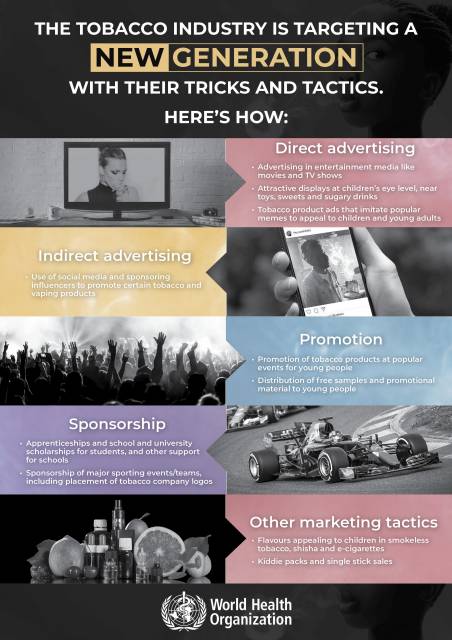You are here
Role of Surveillance to Monitor Novel Tobacco and Nicotine Products
Globally, tobacco use is the leading cause of death, illness and impoverishment and kills more than 8 million people a year worldwide. To raise awareness of the dangers of tobacco use, on May 31, the CDC Foundation and global partners celebrate World No Tobacco Day. Established in 1987 by the Member States of the World Health Organization (WHO), this day brings attention to the tobacco epidemic and the preventable death and disease it causes.
This year’s World No Tobacco Day theme is centered on empowering youth to recognize and resist industry marketing tactics and encouraging them to become a tobacco-free generation. Tobacco and nicotine product industries have used a myriad of tactics to attract youth to their products, such as use of kid-friendly flavors, widespread marketing and advertising and celebrity/influencer sponsorships. These industries are moving swiftly to launch novel products to expand their market share before regulations are in place, as much tobacco control legislation does not cover the marketing, sale and use of new and novel products.
The CDC Foundation supports tobacco and nicotine product monitoring and surveillance on a global level in collaboration with the Centers for Disease Control and Prevention (CDC) and other partners. The data collected allow countries to set priorities and develop and evaluate programs, policies and interventions that are aimed to protect people from the harmful effects of nicotine and tobacco.
We support implementation of select components of the Global Tobacco Surveillance System (GTSS) in partnership with CDC, WHO and other international partners. GTSS provides globally standardized data to track adult and youth tobacco use across the world. The newest component of GTSS—Tobacco Questions for Surveys of Youth (TQS-Youth)—provides a standard set of tobacco-related survey questions for integration into youth surveys. This tool can be incorporated into national and international surveys to monitor tobacco use and key policy measures and includes questions on e-cigarette use. To learn more about global adult and youth tobacco and nicotine use data, resources and other GTSS-related materials check out the CDC Foundation’s GTSS Academy.
The CDC Foundation is grateful to Bloomberg Philanthropies for supporting global tobacco and nicotine surveillance efforts and the Bill & Melinda Gates Foundation for supporting surveillance efforts in sub-Saharan Africa. For more information on surveillance efforts to monitor e-cigarettes and novel products, please visit: bit.ly/gtssacademywntd2020

